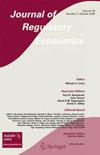自我规制与政府监督:理论与实验研究
IF 1.4
4区 经济学
Q3 ECONOMICS
引用次数: 1
摘要
自律组织(SRO)是由其成员拥有和经营的非政府组织,有权为其成员制定和执行行业法规和标准。一个关键的问题是,SRO的监督是否可以取代政府的监督,或者是否需要补充政府的监督。使用金融部门的正式模型并解决同步博弈,我表明SRO缺乏承诺可能需要政府对SRO成员和SRO本身进行监督。该模型的核心得到了经济学实验的支持。本文章由计算机程序翻译,如有差异,请以英文原文为准。
Self-regulation and governmental oversight: a theoretical and experimental study
A self-regulatory organization (SRO) is a non-governmental organization owned and operated by its members, with the power to create and enforce industry regulations and standards for its members. A key question is whether oversight by an SRO can replace governmental oversight, or whether supplementary governmental oversight is necessary. Using a formal model for the financial sector, and solving simultaneous games, I show that a lack of commitment by the SRO may necessitate governmental oversight of both SRO members and the SRO itself. The core of the model is supported by economics experiments.
求助全文
通过发布文献求助,成功后即可免费获取论文全文。
去求助
来源期刊

Journal of Regulatory Economics
ECONOMICS-
CiteScore
2.40
自引率
0.00%
发文量
14
期刊介绍:
Recent legislative and policy reforms have changed the nature of regulation. Partial deregulation has created a new dimension to regulatory problems, as the debate is extended to include diversification and new forms of regulation. The introduction of incentive-based rate schedules and ratemaking procedures, the integration of demand-side programs with planning for capitol expansion, and other developments, raise a host of theoretical and empirical questions. The Journal of Regulatory Economics serves as a high quality forum for the analysis of regulatory theories and institutions by developing the rigorous economics foundations of regulation. Both theoretical and applied works, including experimental research, are encouraged. Research in all aspects of regulation is of interest including traditional problems of natural monopoly, antitrust and competition policy, incentive regulation, deregulation, auction theory, new policy instruments, health and safety regulation, environmental regulation, insurance and financial regulation, hazardous and solid waste regulation, universal service obligation, and consumer product regulation. The JRE provides researchers, policy-makers, and institutions with current perspectives on the theory and practice of economics of regulation. While there are a number of journals and magazines that include the study of regulation, the JRE is unique in that it fills a gap in the market for a high quality journal dealing solely with the economics of regulation.Officially cited as: J Regul Econ
 求助内容:
求助内容: 应助结果提醒方式:
应助结果提醒方式:


